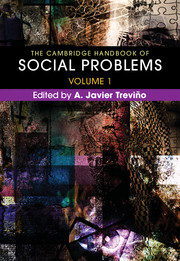Book contents
- The Cambridge Handbook of Social Problems
- The Cambridge Handbook of Social Problems
- Copyright page
- Contents
- About the Contributors
- Introduction
- Part I General Concerns and Orientations in the Study of Social Problems
- Part II Historical and Theoretical Issues in the Study of Social Problems
- Chapter 11 Settlement Sociology
- Chapter 12 Chicago School: City as a Social Laboratory
- Chapter 13 Luhmann's Sociological Systems Theory and the Study of Social Problems
- Chapter 14 The Conflict Approach
- Chapter 15 Radical Interactionism and the Symbolism of Methamphetamine
- Chapter 16 Social Constructionism
- Part III Problems of Discrimination and Inequality
- Part IV Problems of Institutions
- Index
- References
Chapter 12 - Chicago School: City as a Social Laboratory
from Part II - Historical and Theoretical Issues in the Study of Social Problems
Published online by Cambridge University Press: 16 March 2018
- The Cambridge Handbook of Social Problems
- The Cambridge Handbook of Social Problems
- Copyright page
- Contents
- About the Contributors
- Introduction
- Part I General Concerns and Orientations in the Study of Social Problems
- Part II Historical and Theoretical Issues in the Study of Social Problems
- Chapter 11 Settlement Sociology
- Chapter 12 Chicago School: City as a Social Laboratory
- Chapter 13 Luhmann's Sociological Systems Theory and the Study of Social Problems
- Chapter 14 The Conflict Approach
- Chapter 15 Radical Interactionism and the Symbolism of Methamphetamine
- Chapter 16 Social Constructionism
- Part III Problems of Discrimination and Inequality
- Part IV Problems of Institutions
- Index
- References
Summary
From its inception, the University of Chicago became an important center of higher learning in the United States and drew from its environs subjects of urban social research. The City of Chicago was emblematic of the modern metropolis and the problems that seemed to emerge from rapid urbanization and associated demographic change. The Chicago school constituted a scholarly approach to the study of the modern city and its challenges by a group of scholars whose work epitomized progress in both social science and social reform. Through the efforts of a small group of researchers, the city became a social laboratory that yielded deeper understandings of social problems confronting American society at the beginning of the twentieth century.
- Type
- Chapter
- Information
- The Cambridge Handbook of Social Problems , pp. 203 - 220Publisher: Cambridge University PressPrint publication year: 2018

